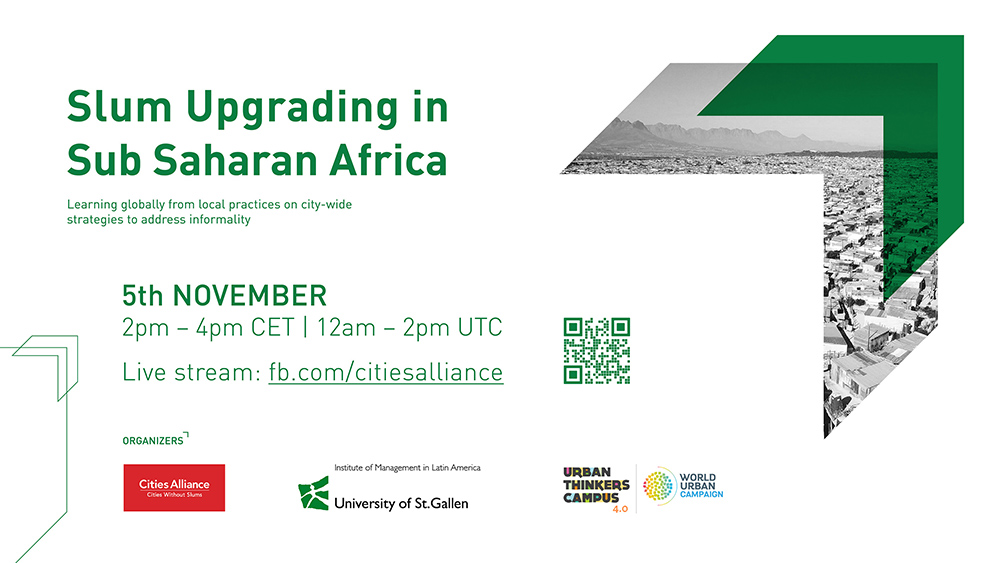Online Seminar
Thursday, 05.11.2020, 14:00 CET
Slum upgrading in Sub Saharan Africa
Learning globally from local practices on city-wide strategies to address informality

The unfolding of COVID 19 pandemic and its specific geographic development within city regions has brought to the forefront the socio- economic cracks of current urbanization patterns. Poor neighborhoods and particularly dense informal settlements are disproportionally at risk of becoming contamination vectors. With the health crisis, the fundamentals of cities are again back on the discussion tables: What cities do we want to live in? And how can we best achieve them?
Furthermore, in order to achieve the SDG targets and overcome their fragmented nature, interventions are needed to create synergies between sectors, unlock creativity and smartly deploy resources and capacities. As it has been increasingly proved, cities are fundamental in achieving multi- sectoral interventions that tackle several SDGs simultaneously. This implies working with municipalities through a multi-stakeholder approach, engaging civil society, private sector organizations, universities and multilateral institutions in the formulation of best practices about the role of cities enabling the achievement of sustainable development goals on the ground.
Among the most crucial themes that impact the daily management of municipalities addressing the pandemic in the Global South, is the challenge of slum upgrading, as well as the planning mechanisms that municipalities can develop in order to guarantee the right to adequate housing and the right to the city. As the New Urban Agenda established, housing is at the center or urban development and there is an urgent need to map and develop diagnosis of informal settlements (SDG 11), as well as to establish adequate policies that are able to promote integration to the city and leave no one behind, as part of National Urban Policy frameworks.
Addressing these multi-disciplinary challenges imply integrating issues such as participatory multi-level governance, coordination of public policies, city-wide planning, disaster risk management, community building and resilience strategies.
The Urban Thinkers Campus (UTC) is an initiative of the World Urban Campaign conceived as an open space for critical exchange between urban researchers, professionals, and decision-makers who believe that urbanization is an opportunity and can lead to positive urban transformations.
As part of the UTC initiative, after initiating the debate on successful projects in Latin America, a webinar series is now proposed organized by Cities Alliance and St.Gallen Institute of Management in Latin America (GIMLA) focused on Slum Upgrading in Sub Saharan Africa. This webinar will present three promising city-wide initiatives that aim at improving lives of slum dwellers and reduce the inequality in the access to urban infrastructure and amenities. A round table shall situate these efforts within the larger challenge of the unfolding pandemic by debating ongoing adjustments to the programs as well as the question of how to make slum upgrading a priority in the post-COVID recovery process.
Practitioners, academics, and the interested public are invited to join this free webinar and round table debate, as well as the second webinar on Slum Upgrading in Asia on December 4. The insights gained from the debate on three regional experiences in slum upgrading projects will directly inform a special session at the LAC Regional Housing and Habitat Forum envisioned for May 2021.
- 15 min - General introduction on challenges of slum upgrading in Sub Saharan Africa
- 45 min – Presentation of Best Practices and Lessons learned from countries and panelists - South Africa, Kenya, Sierra Leone
- 15 min – Q&A interactive session
- 45 min – Round Table Debate on Slum Upgrading under and after COVID 19